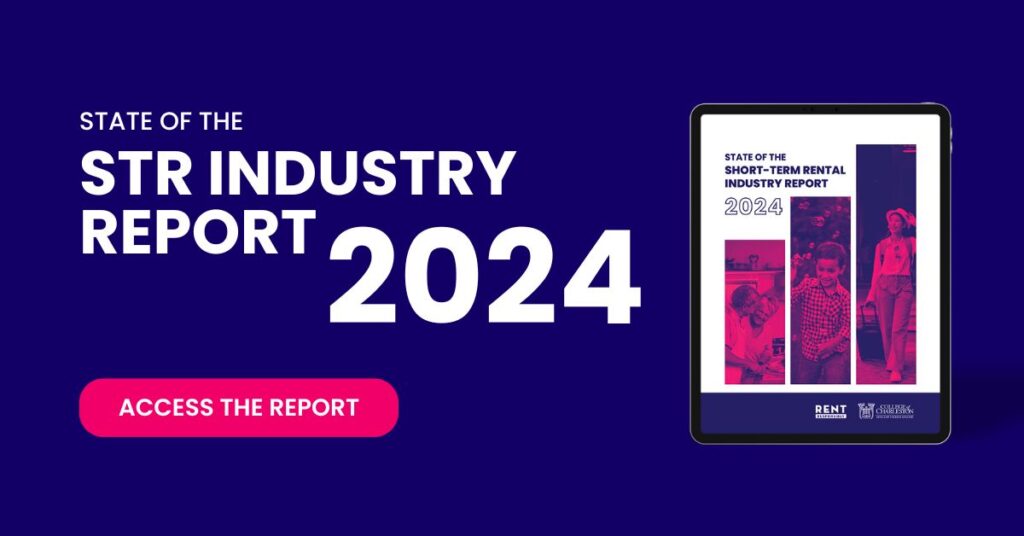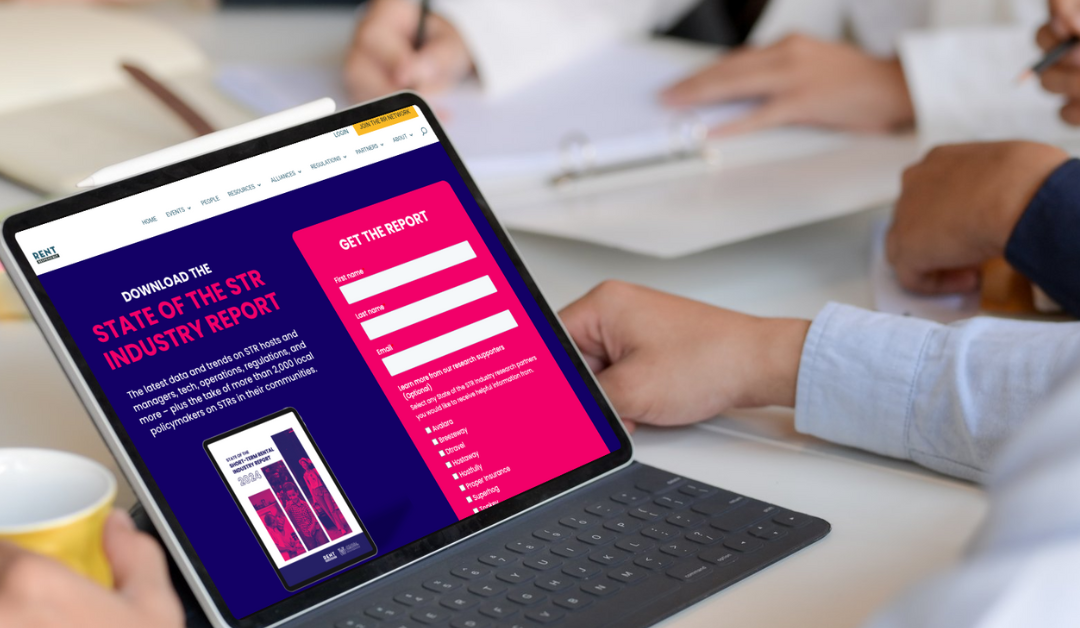Updated on September 10, 2024
The reality of short-term rental hosts’ lives and the hard work they routinely invest in their properties, guests, neighbors, and communities are often lost in sound bites or behind well-known listing platforms.
The 2024 State of the Short-Term Rental Industry Report provides a better understanding of STR operators, how hosting affects their livelihoods, how they contribute to their local economies, their challenges, and the best practices they’ve adopted.
These statistics give STR operators an insight into themselves as a larger hosting community and offer valuable talking points for advocacy and molding the industry’s future.
Here, we’ll explore the report’s top takeaways for hosts. The data comes from responses from 3,535 STR owners, 469 property managers, 743 elected officials, and 816 government staff during a survey in April 2024. The study is the largest of its kind to date.
Mom-and-pop businesses
Most (two-thirds) of STR owners own only one property and earn supplemental income (20% or less of their total income) from hosting. Nine in 10 owners self-manage their short-term rental property.
About 94.6% of operators support local businesses like restaurants and shops through purchases and referrals. Personal recommendations to local restaurants, attractions, and activities were the most common amenity hosts offered guests.
Short-term rental operators also contribute to the economy by employing local workers. More than two-thirds of property management firms employed full-time workers, and 72% employed part-time workers.
💡 Data in Action
Understanding that most STR owners are small-scale operators who support local businesses shows the value these small businesses add to the local community and economy and the authentic local experience for guests. This data is critical in conversations about the STR industry, including during advocacy efforts, chamber of commerce meetings, or other gatherings within and outside the STR community. Hosts can also showcase these qualities in their branding and marketing to appeal to guests looking for authenticity.
Read more: How to create a great guest vacation rental experience by supporting local businesses
Importance of responsible hosting
Neighborhood character and nuisance prevention remain top concerns for local governments. Elected officials’ three top concerns related to STRs were neighborhood character (58.5%), noise issues (41%), and parking issues (39.6%).
Fortunately, many hosts are already taking proactive steps to mitigate nuisance concerns. Roughly two-thirds of operators have procedures to prevent noise, trash, and parking issues.
💡 Data in Action
Nuisance complaints are often a driver of overly restrictive STR regulations. Hosts can mitigate these issues by taking preventative measures, such as appointing a local responsible party, providing in-unit resources like noise-monitoring devices, and proactively communicating clear, repetitive instructions in messages, guidebooks, and strategically placed signage.
Read more: Communication Playbook: Guest Messaging for 5-Star Reviews
Rising Regulations & Advocacy
Many jurisdictions either have or are planning to enact STR ordinances. Half of the jurisdictions stated they already have one. About 22.4% of those expected to modify the ordinance in the next year. About a quarter of jurisdictions without an STR ordinance planned to enact one within a year. That extrapolates to an estimated 8,746 jurisdictions that will enact or update STR ordinances in the next 12 months.
Only 18% of elected officials felt they had enough information to inform their STR policy decisions. The primary way elected officials garner community input on STR policies is through public comment forums.
When asked how STR operators could support policy-making, public officials’ top four answers were 1) participating in public comment, 2) collaborating on policy solutions, 3) providing data the jurisdiction doesn’t have, and 4) sharing how they support the community.
Over 40% of STR operators plan to engage in advocacy next year, reflecting a growing awareness of the importance of participating in local policy discussions. Many hosts feel their input is crucial in shaping fair and effective regulations.
💡 Data in Action
Some STR regulations can negatively impact STR businesses. In fact, over half of operators say that regulations have already harmed their business. Active involvement in local policy discussions can help shape favorable regulations and protect the interests of STR operators. Join or start an STR alliance, participate in advocacy activities, and engage with local government to ensure your voices are heard in the regulatory process.
Next: See our library of advocacy resources.
Hosts’ nonregulatory concerns
Hosts identified their three greatest nonregulatory concerns as declining demand for short-term rentals (45.3%), guest property damage (43.9%), and normal property wear and tear (41%). Proactive guest communication (71.8%) and property safety measures (62.1%) were the top methods for decreasing these short-term rental liabilities.
💡 Data in Action
Concerns like these are common, but risk mitigation is possible! Diversify your marketing efforts to maintain demand and reach new traveler segments, invest in property insurance or damage deposits to mitigate risks, regularly maintain your properties early and often to manage wear and tear, and clearly communicate house rules to make sure guests understand their role in reducing risks.
Next: Join or log in to the RR Network for featured reading lists on marketing, dreaded hosting what-ifs, guest communications, and more.
Technology adoption
STR operators are increasingly adopting technology to streamline operations. 74.4% of operators offer keyless locks, 49.1% have security cameras, and 48.8% use smart thermostats. Hosts’ most common operational technologies involved guest communication (guidebooks, guest text tools, and guest email tools), followed by all-in-one property management software and pricing or revenue management software.
💡 Data in Action
Technology can streamline operations, improve guest experiences, and strengthen security, giving hosts a competitive edge and leading to better reviews. Invest in technology such as keyless entry, smart thermostats, and security cameras, and if you have multiple properties, consider property management software to improve efficiency and guest satisfaction.
Next: Join or log in to the RR Network for our exclusive STR tech guide series.
Sustainability and accessibility
Many STR operators are adopting sustainability practices, such as offering recycling (60.4%), using energy-efficient appliances (59.2%), and minimizing single-use disposables (40.8%). Hosts are also offering more accessibility features, such as hard surface driveways (41.6%) and wide doorways (32.2%).
💡 Data in Action
Sustainability practices and accessibility features are important to guests and can set a property apart in a competitive market. Many sustainability practices, too, help reduce costs like water and energy bills. Implement sustainable practices, such as energy-efficient appliances and minimizing single-use products, and make gradual changes to make your property accessible to more people with disabilities.
Read more: 8 ways to make your short-term rental more accessible to guests with disabilities for $100 or less
STR industry events & networking
Over 52.2% of operators do not plan to attend any STR industry events or conferences in the coming year. Out of the nearly 48% who planned to attend an industry event or conference, the vast majority said it would be a virtual conference or webinar.
Most operators (55.1%) engage with peers online in networks and forums. The most commonly used online network platforms are Facebook groups and STR alliance/association member portals. The majority of operators participate in online networks or forums to stay up-to-date on news or trends and to learn from their peers.
STR alliances are becoming more prevalent, and 42.3% of operators have already joined one. However, nearly 34.4% of operators live in communities that do not have STR alliances.
💡 Data in Action
Engaging with the broader STR community through industry events and networking creates opportunities to learn and collaborate with peers and stay ahead in a competitive market. Keep up to date on events and networking opportunities in your area and online.
Membership in an STR alliance brings particular benefits, such as networking, mutual support, advocacy power, and access to collective professional development. Join your local STR alliance or start your own.
For help starting a new alliance, Rent Responsibly can help! Check out our resources and Alliance Management Services.


